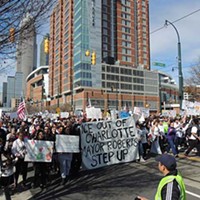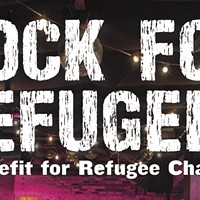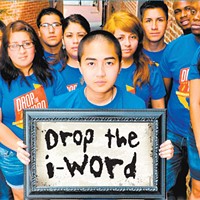When More than 7,000 immigrants descended on Marshall Park in Charlotte on Friday, Feb. 17, and marched into Uptown to express their frustration and fears about being targeted and harassed by the current presidential administration, it was a little disappointing to see so few non-brown faces in the crowd. After all, just a month earlier, on Jan. 21, the 10,000 people who had shown up to stand alongside their daughters and sisters and mothers at the Women's March on Charlotte had transformed Romare Bearden Park into a giant Benetton ad.
Two CL reporters — news editor Ryan Pitkin and intern Jasmin Herrera — were at the Charlotte edition of the A Day Without Immigrants march, Herrera with her camera and Pitkin with his notepad. We posted a slide show of the faces they captured the following day on our clclt.com blog, and in this issue, Pitkin delves more deeply into the wave of terror that our immigrant neighbors and their children have experienced in the days since the march, as Immigration and Customs Enforcement (ICE) officials continue to ramp up their raids and arrests in targeted communities.
The fact is, harassment of immigrants, undocumented or not, is hardly a new thing here, according to Jose Hernandez-Paris, executive director of the Latin American Coalition. "This has been going on for a number of years," he tells Pitkin in this issue's cover story. "It has been building for about 15 to 20 years now. But it's nothing compared to what's happening this time."
CL has followed this development from the first day I arrived as editor in June 2005. Coverage of immigration issues and communities of color was among my stated priorities during my first go-round at the paper. In my editor's note of July 6, 2005, I wrote that Jesse DeConto's cover story, "New Latino South" — which explored the roots of North Carolina's growing Latino culture — "shows conclusively that Latinos not only have a birthright to broader America, but that Hispanic culture hit the South long before our gringo forefathers dreamed of the sandy Outer Banks or the majestic Appalachian Mountains."
Seven years later, almost to the day, we made a promise to stop using the word "illegal" in describing immigrants. CL was the only media outlet in the area to make that promise, although others across the country had also done so. It was our editorial position that the word had become little more than a veiled racial epithet.
"Many things are illegal — murder, rape, driving while impaired, selling drugs — but human beings aren't," I wrote in the editor's note of July 4, 2012. "Simply living in a country without proper documentation does not make a person any more of an 'illegal' than a driver without a license does. People are not 'illegals,' and Creative Loafing Charlotte will not be defining them that way."
In the wake of the current president's horribly misguided executive order, Charlotteans of conscience must stand up for the rights of our immigrant neighbors, and not just our Latino neighbors. This city has been blessed with numerous vibrant immigrant communities that have made Charlotte the attractive destination it's become. They've added new textures and nuance to our arts, our music, and most importantly, to the city's very soul. They've brought economic muscle to Charlotte. They've made the city more... well, they've made it more American. Immigration is what makes America great, despite the rantings of the current bully-in-chief.
In my report on a refugee benefit concert that takes place later this week at the Evening Muse, one of the organizers, Lindsay LaPlante of Refugee Charlotte, tells me, "We hope this show brings a focus on a community that's very much a part of who we are as a city. These people are very much a part of Charlotte, they've brought so much to this city. And we want people to understand that. We all should know who our neighbors are."
And we all should be standing with them. Just as we did with our mothers and sisters and daughters. It was very heartening to see so many Charlotteans drawing up signs, locking arms and singing alongside the women of our community the words to Woody Guthrie's "This Land is Your Land" in Romare Bearden Park. But perhaps it's time we also look to another song by that great American folksinger of the 1930s and '40s — "Deportee," his still-relavant lament about the inhumane treatment of our immigrants neighbors: "Goodbye to my Juan, goodbye Rosalita," the song goes. "Adios mis amigos, Jesus y Maria / You won't have a name when you ride the big airplane / All they will call you will be 'deportee.'"
Watch Ani DiFranco sing "Deportee" at a Woody Guthrie tribute.


